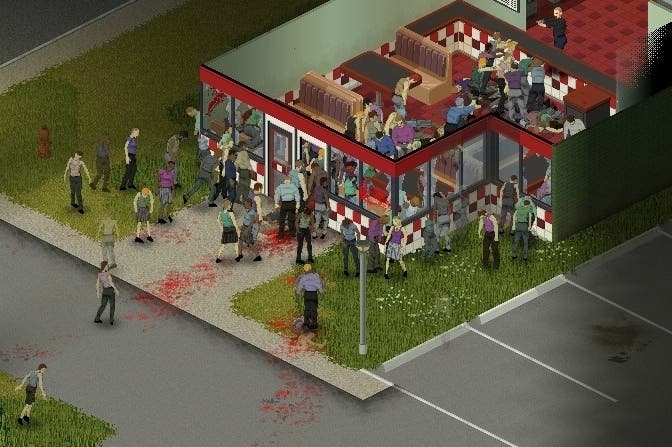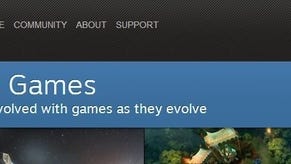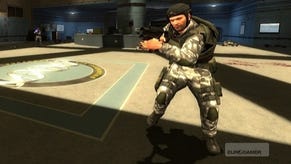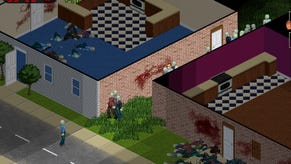Project Zomboid alpha review
I will survive.
Eurogamer's alpha and beta reviews are reviews of games that are still in development but are already being offered for sale or funded by micro-transactions. They offer a preliminary verdict but have no score attached. For more information, read our editor's blog.
"This is how you died."
This cheery caption appears not on the Game Over screen of Project Zomboid but right at the start, before you've even started playing. Straight away, it's setting your expectations to a more realistic level. In short: this is not a game you're going to win.
As the lone survivor of a zombie outbreak in the state of Kentucky, now locked down and quarantined, your goal is survival. Actual, proper survival, not the bastardised version we've been taught to expect from other games. It's not a test of strength or even cunning, but a test of your sheer bloody-mindedness. How can long can you persist in a truly hopeless situation, before you make a catastrophic mistake and end up torn to shreds?
Viewed from a classic isometric point of view, first impressions of the game are, somewhat bizarrely, reminiscent of The Sims. Despite your godlike perspective, your view of the map is limited to what your characters sees. Enter a building and the outside world disappears, except for whatever slices are visible through the windows. More dangerously, turn your back on zombies and they fade from view.
So, you're in a little house, and right clicking on the appliances and furnishings brings up all manner of domestic options. Turn on the cooker. Read a book. Close the curtains. That last one is pretty important, since outside is a world filled with the undead, and they're pretty astute considering there's no oxygen flow to the brain. They'll see you through windows, be drawn to light and sound, and will throw themselves against windows and doors until they get inside, once they know you're in there.
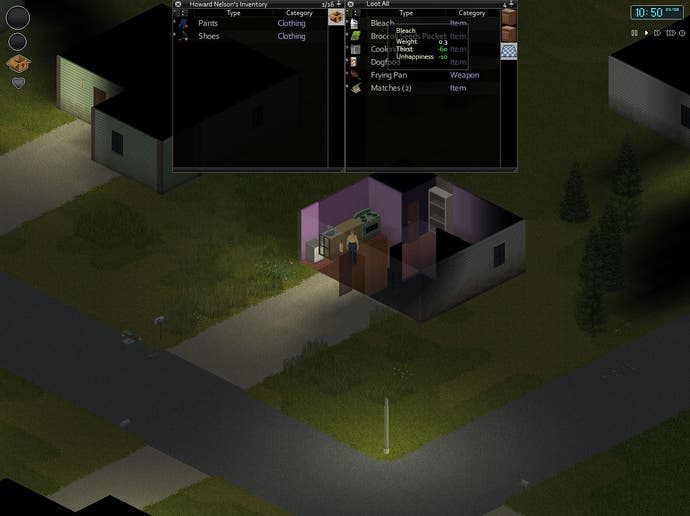
There are no missions in Project Zomboid, so your goal is simply to do whatever you can to stop that happening. This means making desperate and dangerous forays outside, rummaging through bins and trying to find unlocked doors that will let you loot nearby buildings.
It is, it must be said, all rather familiar. Project Zomboid has been in development for several years now, and has suffered various cruel setbacks along the way - from burgled laptops to frozen PayPal accounts to rampant piracy. That it even exists at all is a small miracle. Now, of course, we're not exactly spoiled for choice when it comes to zombie survival sandbox games. DayZ is clocking up huge numbers for its own early access build, while State of Decay does much the same thing in a more GTA kind of way. And that's not even mentioning thematically similar games like Don't Starve, 7 Days to Die and upcoming titles such as Epic Games' collaborative barricade-builder Fortnite and Robotoki's Human Element. Clearly, we're not going to be short of games that let us nail planks over windows and hoard canned goods.
To begin with, it's hard to see what Project Zomboid offers that the others don't, but the longer you play the more it comes into focus. Partly it's in that fatalistic streak hinted at in the opening caption - the knowledge that what you're aiming for is one more day of life, maybe, rather than a predetermined game-ending victory. Mostly, however, the difference is in the depth of the systems that Zomboid offers.
Consider the act of fortifying your safe house. In most similarly themed games, you just stand next to a window and hold down a button. In Zomboid, it not only means finding wood, but a hammer and enough nails to do the job. Yes, this is a game where every single individual nail counts. Raw food must be cooked, candles need matches or lighters, and if you don't have curtains or bandages you'll need to improvise with bed sheets. Sometimes you'll start the game in just your undies and need to find clothes.
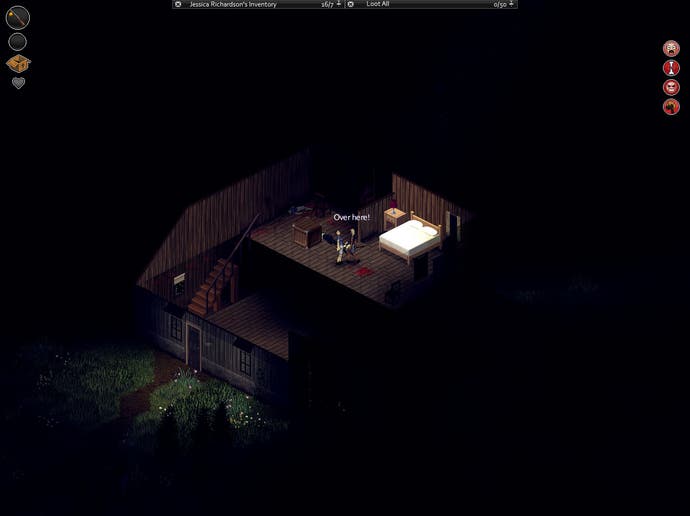
Your character is also a more complex creature than we're used to. Needs such as hunger and thirst are typical enough, but there's a psychological aspect that too often goes unexplored in post-apocalyptic games. During one game, I found myself holed up in a house, but got my sleep cycles all mixed up - I found my character waking up at 1am, forced to pace around his makeshift fortress for hours rather than risk a supply run in the dark. He began to get bored. Those magazines I'd left behind on previous scavenging runs suddenly didn't seem so useless. And with the undead scratching at the door, boredom easily slips into panic and depression. Zomboid is a game as much about the emotional process of survival as the practicality of food and shelter.
The world, too, is slowly evolving with each update. Variable weather now means that thunderstorms can strike, offering suitably gothic effects, but also introducing the prospect of exposure and related illnesses. More than once I found myself caught in a downpour, hunting desperately for shelter not just from the zombies but the elements themselves. Dip into Zomboid's Sandbox mode, where you can tweak the game settings to your liking, and you'll get a preview of what awaits you further into the Survival game. Just like a real disaster, electricity supplies will go offline eventually. Fresh water will run out. Everywhere you turn, there's a ticking clock, counting down to another emergency you'll need to plan for.
It's relentless stuff and, unsurprisingly, a pretty tough game. The zombies are in the classic George Romero style, slow and shambling, but it only takes two or three to present a deadly threat. Truly effective weaponry is scarce. I almost whooped for joy when I found a sledgehammer after four hours of play across multiple doomed characters, all of whom had to defend themselves with butter knives and dinner forks. Then I swung the hammer a few times, was too exhausted to lift it for another swing, and got eaten. Again.
You'll invest hours to make agonising progress, fail almost constantly, and yet still dive straight back in for another go because it's so much fun to hurl yourself against the game's systems
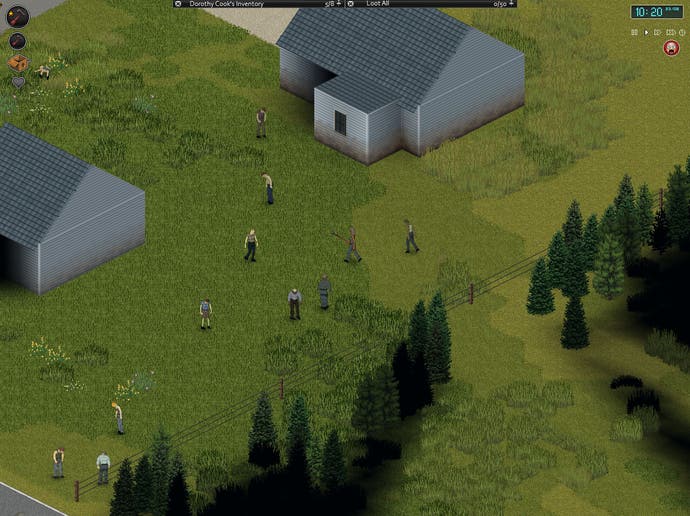
The rhythm of the game has a lot in common with the indie hit FTL. This is a game where you'll face procedurally generated obstacles, invest hours to make agonising progress, fail almost constantly, and yet still dive straight back in for another go because it's so much fun to hurl yourself against the game's systems.
When it's finished, Zomboid should be something very special indeed, but that's a fair way off yet. This is a true alpha build, and unless you're willing to put up with a lot of glitches and bugs - and make the effort to report them on the game's forum - you'd be advised to hold off until a few more updates have been made.
Objects disappear, things don't always respond when you click on them and the absence of any in-depth tutorial means that a lot of the game's deeper systems, such as the growing of vegetables and cooking hot meals, take a lot of trial and error to understand. Visually, too, it's still a bit scruffy-looking, with finer details easy to miss even when you zoom right in. On my very first game, my character got stuck in an animation loop while closing curtains and spent the zombie apocalypse looking like they were constantly doing aerobics.
But then this is a small team creating an incredibly dense and detailed world, with many layers of deep interaction. It's understandable that they haven't quite stitched everything together just yet. What is there, while scrappy, is incredibly promising and, crucially, great fun to play even in this embryonic state. That's the true test of any alpha-stage early access - does the game sink its hooks into you, even when its mechanisms are still being slotted into place? Project Zomboid answers that question with a confident affirmative, and while it may be entering a marketplace crowded with similarly doom-laden experiences, its ruthlessly unforgiving approach to survival gameplay means that it already stands out from the undead herd.
Eurogamer's alpha and beta reviews are reviews of games that are still in development but are already being offered for sale or funded by micro-transactions. They offer a preliminary verdict but have no score attached. For more information, read our editor's blog.
